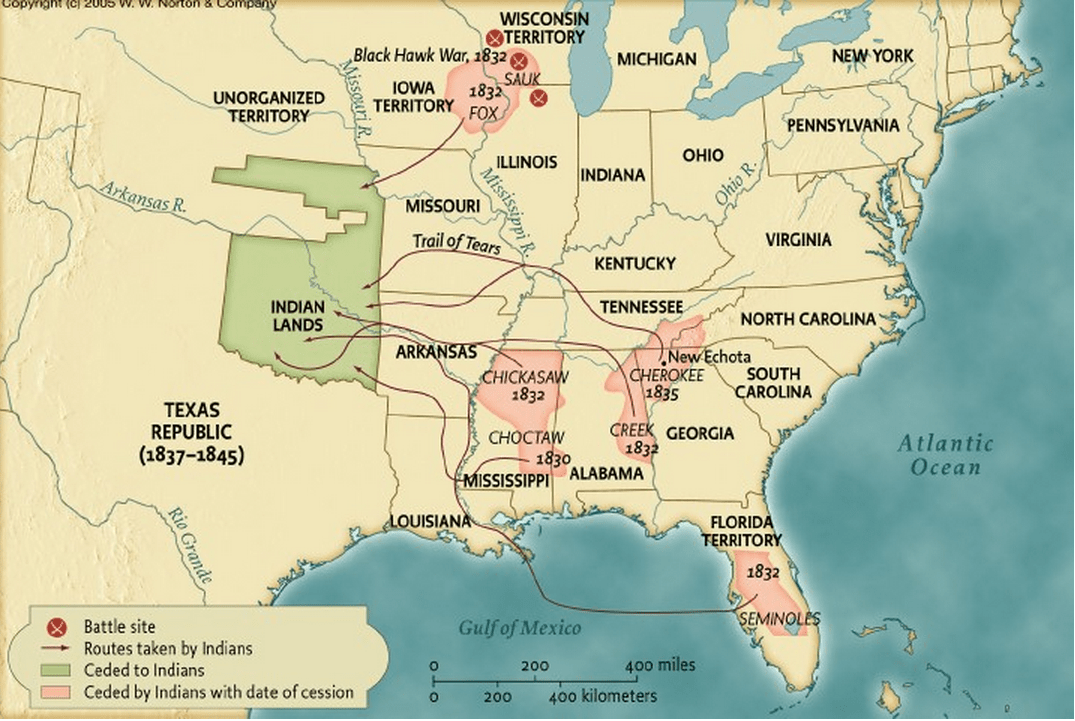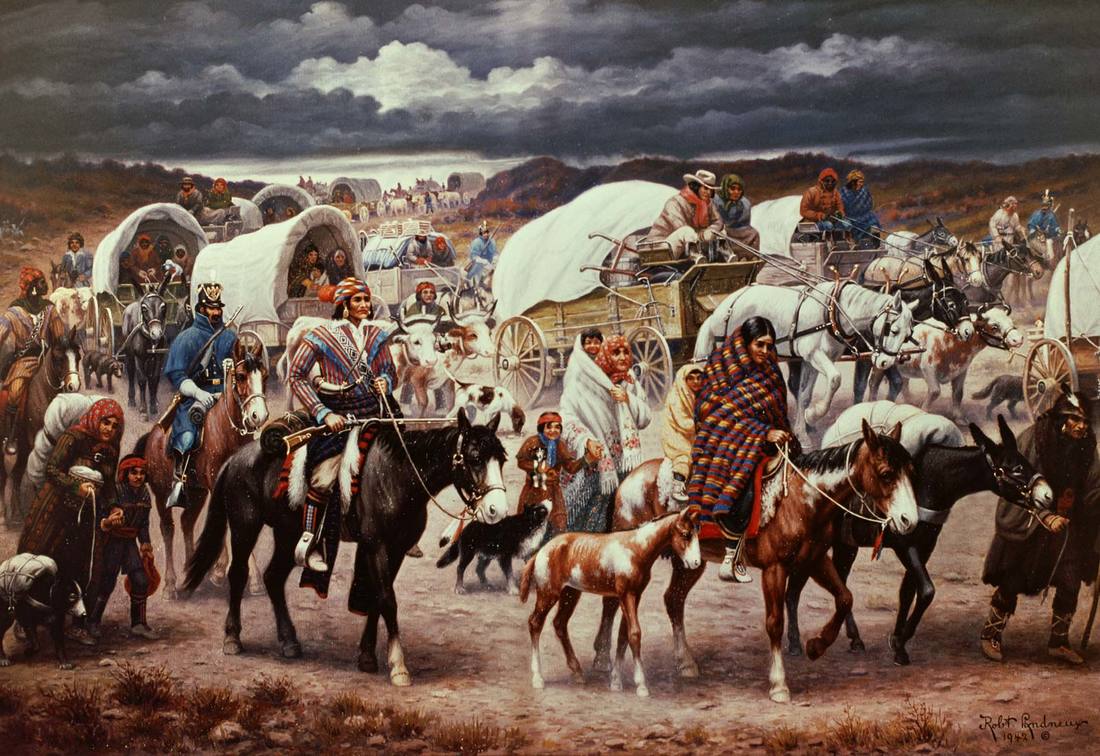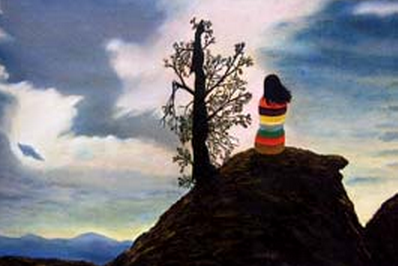
Station #1 - Map of the Trail of Tears - Following the Indian Resettlement Act of 1830, the Native Americans were forced out of their homes in Georgia, Mississippi, Florida, and Iowa / Wisconsin territories. They were relocated to an unsettled region West of the Mississippi - present day Oklahoma, Texas, and Kansas. Use the map below to answer the questions on your chart.

Station #2 - Andrew Jackson’s Message to Congress (1830) - On December 6th 1830, President Andrew Jackson addressed Congress and asked for their support with the relocation of Native Americans. Please read the selection of his speech below to answer the questions in the chart.
It gives me pleasure to announce to Congress that the policy. in relation to the removal of the Indians beyond the white settlements is approaching to a conclusion….The consequences of a speedy removal will be important to the United States, to individual States, and to the Indian themselves… It will place a larger and civilized population in parts of country now occupied by a few savage hunters….By opening the whole territory between Tennessee on the north and Louisiana on the south to the settlement of the whites it will strengthen the southwestern frontier against possible invasion by foreign countries. It will relieve the whole State of Mississippi and the western part of Alabama of Indian occupancy, and let those States to advance rapidly in population, wealth, and power. It will separate the Indians from immediate contact with settlements of whites; enable Indians to pursue happiness in their own way and under their own rude institutions; will slow the progress of decay, which is lessening their numbers, and perhaps cause them gradually, under the protection of the Government to cast off their savage habits and become an interesting, civilized, and Christian community. What good man would prefer a country covered with forests and ranged by a few thousand savages to our extensive country, studded with cities, towns, and prosperous farms embellished with all the improvements which art can devise or industry execute, occupied by more than 12,000,000 happy people, and filled with all the blessings of liberty, civilization, and religion. To save him from this alternative, or perhaps utter annihilation, the General Government kindly offers him a new home, and proposes to pay the whole expense of his removal and settlement.
Station #3 - Cheroke Nation - Trail of Tears - In 1838 and 1839, large groups of Cherokee people migrated to the newly formed Indian territories along a pathway that would become known as the “Trail of Tears”. The migrants faced disease, hunger, and exhaustion on the forced march; 4,000 out of 15,000 Cherokee peoples died along the path. View the following two images created depicting the Trail of Tears. The first was painted in 1942 by Robert Lindeneux. The second, by an unknown artist in 1982. Following your observations, please answer the questions in the chart.


Station #4 - Southern Plantation Owners - Many plantation owners and farmers in the south supported the removal of Native Americans, because it gave them greater lands on which to farm and live. Read the following excerpt and answer the questions in the chart.
“Some of you (southerners) are poor farmers. You live on the worst land in Georgia and other parts of the south. The big plantation owners with all their cotton and slaves take up the best land and leave you the scraps. You’ve heard that the Cherokee land in Georgia is some of the most fertile land in the country. Best yet, the government of Georgia is having a lottery so that even poor farmers like you will have an equal shot at getting good land… And some of you are big plantation owners who grow cotton on your land and own many slaves. You live in Georgia near the coast. The problem is cotton exhausts the soil, so that after a number of years, your land is not as productive as it once was. You need new land with soil that hasn’t been used to grow cotton for years and years. As of now, the Cherokee are living on the land that rightfully belongs to the state of Georgia… There is a place set aside for the Cherokee and other Indians west of the Mississippi River. They belong with their own kind, right? Remember - the whole country - no the whole world - depends on cotton. Your plantation and plantations like yours are what keep this country strong!”
Station #5 - Cherokee Nation - The following is an excerpt from the closing paragraphs of an address made by a council of Cherokee people to the United States in July 1830. Read the following excerpt and answer the questions in the chart.
We are aware, that some persons suppose it will be for our advantage to remove beyond the Mississippi. We think otherwise. Our people universally think otherwise…. there is probably not an adult person in the Cherokee nation, who would think it best to remove…
We wish to remain on the land of our fathers. we see nothing but ruin before us. The country west of the Arkansas territory is unknown to us. From what we can learn of it, we have no prepossessions in its favor. All the inviting parts of it, as we believe, are preoccupied by various Indian nations. They would regard us as intruders, and look upon us with an evil eye. All our neighbors, in case of our removal, though crowded into our near vicinity, would speak a language totally different from ours, and practice different customs…Were the country to which we are urged much better than it is represented to be and were it free from the objections which we have made to it, still it is not the land of our birth, nor of our affections. It contains neither the scenes of our childhood, nor the graves of our fathers.
Station #6 - First-hand account from Samuel Cloud. After reading this account, answer the questions on your chart.
It is Spring. The leaves are on the trees. I am playing with my friends when white men in uniforms ride up to our home. My mother calls me. I can tell by her voice that something is wrong. Some of the men ride off. My mother tells me to gather my things, but the men don’t allow us time to get anything. They enter our home and begin knocking over pottery and looking into everything. My mother and I are taken by several men to where their horses are and are held there at gun point. The men who rode off return with my father, Elijah. They have taken his rifle and he is walking towards us.
I can feel his anger and frustration. There is nothing he can do. From my mother I feel fear. I am filled with fear, too. What is going on? I was just playing, but now my family and my friend’s families are gathered together and told to walk at the point of a bayonet.
We walk a long ways. My mother does not let me get far from her. My father is walking by the other men, talking in low, angry tones. The soldiers look weary, as though they’d rather be anywhere else but here.
They lead us to a stockade. They herd us into this pen like we are cattle. No one was given time to gather any possessions. The nights are still cold in the mountains and we do not have enough blankets to go around. My mother holds me at night to keep me warm. That is the only time I feel safe. I feel her pull me to her tightly. I feel her warm breath in my hair. I feel her softness as I fall asleep at night. As the days pass, more and more of our people are herded into the stockade. I see other members of my clan. We children try to play, but the elders around us are anxious and we do not know what to think. I often sit and watch the others around me. I observe the guards. I try not to think much about my hunger. I am cold.
Several months have passed and still we are in the stockades. My father looks tired. He talks with the other men, but no one seems to know what to do or what is going to happen. We hear that white men have moved into our homes and are farming our fields. What will happen to us? We are to march west to join the Western Cherokees. I don’t want to leave these mountains.
My mother, my aunts and uncles take me aside one day. “Your father died last night,” they tell me. My mother and my father’s clan members are crying, but I do not understand what this means. I saw him yesterday. He was sick, but still alive. It doesn’t seem real. Nothing seems real. I don’t know what any of this means. It seems like yesterday, I was playing with my friends.
I hear myself call her name, softly, then louder. She does not answer. My aunt and uncle come over to see what is wrong. My aunt looks at my mother. My uncle pulls me from her. My aunt begins to wail. I will never forget that wail. I did not understand when my father died. My mother’s death I do not understand, but I suddenly know that I am alone. My clan will take care of me, but I will be forever denied her warmth, the soft fingers in my hair, her gentle breath as we slept. I am alone. I want to cry. I want to scream in rage. I can do nothing.
We bury her in a shallow grave by the road. I will never forget that lonesome hill of stone that is her final bed, as it fades from my sight. I tread softly by my uncle, my hand in his. I walk with my head turned, watching that small hill as it fades from my sight. The soldiers make us continue walking. My uncle talks to me, trying to comfort me. I walk in loneliness.
I know what it is to hate. I hate those white soldiers who took us from our home. I hate the soldiers who make us keep walking through the snow and ice toward this new home that none of us ever wanted. I hate the people who killed my father and mother.
I hate the white people who lined the roads in their woolen clothes that kept them warm, watching us pass. None of those white people are here to say they are sorry that I am alone. None of them care about me or my people. All they ever saw was the color of our skin. All I see is the color of theirs and I hate them. The forced removal of the Cherokee in 1838-39 from their homelands in the east to Indian Territory (now Oklahoma) is known as the “Trail of Tears” or “The Trail Where They Cried”.